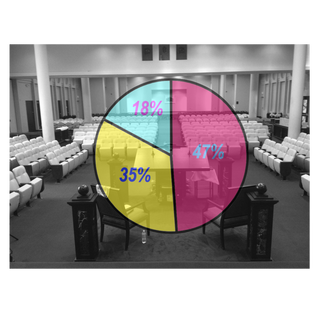| Some leaders think they cannot worry about the people they will never win over. That's an idea that has been in the news lately. So, it seems like a good time to make a confession about rabbis. We, too, have a large percentage of our population that we sometimes are tempted to ignore. The Days of Awe are a time for making confessions and seeking forgiveness for our sins and flaws, so let me ask forgiveness for myself. I apologize for the ways that I sometimes see the numbers and neglect to see the people. |
Of course, I also see some faces that are around the synagogue less frequently. There are parents of children in our religious school who might attend services sporadically over the year. There are people on the periphery of the congregation who attend and support the congregation occasionally, but who mostly stay on the sidelines. There are people who were very active in the past, or in previous congregations, but they feel they now have completed their duty. There are people who only come a few times a year, but make a big difference when they do participate with their enthusiasm and true love of Torah and the Jewish people. This is the largest percentage of the congregation. Let's say they make up 47%, just to pick a number.
Then there is the other 35%. These are the people who come to the High Holy Days, especially if they land on a weekend and if they don't have other plans. They send in their membership contributions every year, even though they say they, "don't use the Temple so much." They do count on the synagogue to be there for them when they need it. They want the rabbi to officiate at a funeral when a close relative dies. They want to be visited in the hospital when they are sick. However, it is unlikely they will come to the congregation's help when the congregation needs it.
So, here is my confession. Paying attention to the first 18% is easy. Every rabbi does that. Frankly, it is a privilege to care for people who care so much about the Jewish community. No problem there.
It may be surprising that we also worry a lot about the last 35%. We wonder if we are one bad holiday sermon or one unreturned phone call away from losing them. We worry if they will decide not to renew their membership, not to be a part of the Jewish community, not to keep Judaism in their lives.
We forget about the 47%, though. We forget that it is also our job to make sure that they stay connected—and not just with their membership dollars or by sending their kids to religious school. Many of the Rabbi's 47% are people who are on the periphery because they feel that there is no place for them in the center.
They do not have time to volunteer or the discretionary funds to make a large contribution. They love being Jewish, but the adult education and other programs at the synagogue do not appeal to them. They have busy lives and the synagogue, while important, has to wait in line for their attention along with the PTA, their kids' sports commitments, their secular social circles, their jobs, their families, and the rest of their lives. We sometimes forget about these people … and we cannot afford to do that.
Most rabbis and most congregational leaders complain that It is always the same people who do all the work and all the giving all the time. Sometimes, though, rabbis and lay leaders do not realize the ways in which we create barriers for nearly half of the congregation. Many of this forgotten half, if asked to do something specific that would interest them, would be ready to pitch in. Many of them feel shut out of participating because they are not in the same age group or social circle as the congregation's leaders. Some just don't know how they can help, or they have never been asked.
(Surveys and flyers don't count as asking. People want to be asked in person. They want to be asked in a way that respects their time and their abilities.)
It's my job to care about these people, too, and often I forget to do that. I am sorry for that.
We are one people and there aren't all that many of us. Nobody can be left out. We are a people who celebrate our unity. When we divide ourselves into smaller and smaller statistical pieces, we forget to see the people behind the numbers.
On Yom Kippur, when I look out over the congregation, I want to see all of them. I want to see each of them as an individual with lives that are complicated, interesting, busy and beautiful. I want to open my heart to doing what I can to allow each person to find his or her joyful place in the community of the Jewish people.
L'shanah tovah tikateivu.


 RSS Feed
RSS Feed
